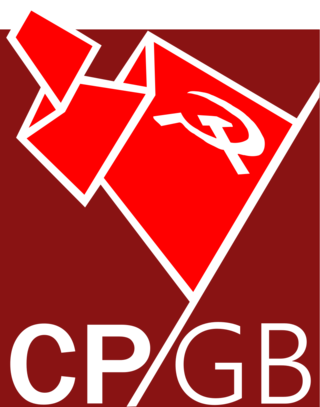
The Communist Party of Great Britain is a political group which publishes the Weekly Worker newspaper. The CPGB (PCC) claims to have "an internationalist duty to uphold the principle, 'One state, one party'. To the extent that the European Union becomes a state then that necessitates EU-wide trade unions and a Communist Party of the EU". In addition, it is in favour of the unification of the entire working class under a new Communist International. It is not to be confused with the former Communist Party of Great Britain, the Communist Party of Great Britain (Marxist–Leninist), or the current Communist Party of Britain.

The New Communist Party of Britain is an anti-revisionist Marxist–Leninist communist party in Britain. The origins of the NCP lie in the Communist Party of Great Britain from which it split in 1977. The organisation takes an anti-revisionist stance on Marxist–Leninism and is opposed to Eurocommunism. After the fall of the Soviet Union the party was one of two original British signatories to the Pyongyang Declaration in 1992. It publishes a newspaper named The New Worker.
The Weekly Worker is a newspaper published by the Communist Party of Great Britain (CPGB-PCC). The paper is known on the left for its polemical articles, and for its close attention to Marxist theory and the politics of other Marxist groups. It claims a weekly online readership averaging over 20,000, Weekly Worker simultaneously also distributes 500 physical copies a week.
Communist League or League of Communists may refer to:
The Communist League of Great Britain was an anti-revisionist group in the United Kingdom.

Harpal Brar is an Indian communist, politician, writer and businessman, based in the United Kingdom. He is the founder and former chairman of the Communist Party of Great Britain (Marxist–Leninist), a role from which he stood down in 2018.
The Communist League was one of the first Trotskyist groups in Britain, formed in 1932 by members of the Communist Party of Great Britain in South London, including Harry Wicks, who had been expelled after forming a loose grouping inside the CPGB known as the Balham Group. This became the British Section of the International Left Opposition and adopted the name Communist League in June 1933. They published a monthly newspaper, Red Flag, and a quarterly journal, The Communist.
The Stalin Society is a British discussion group for individuals who see Joseph Stalin as a great Marxist–Leninist and wish to preserve his legacy. The society originated as a consequence of the dissolution of the Soviet Union and what the members perceived as a subsequent increase in the criticism of Stalin. According to the Stalin Society's website, "[t]he Stalin Society was formed in 1991 to defend Stalin and his work on the basis of fact and to refute capitalist, revisionist, opportunist and Trotskyist propaganda directed against him".
Committee to Defeat Revisionism, for Communist Unity was a small British Marxist–Leninist group that left the Communist Party of Great Britain in 1963. CDRCU was led by Michael McCreery, the son of General Sir Richard McCreery. CDRCU was sympathetic towards the Chinese Communist Party and the Party of Labour of Albania, with CDRCU members attending May Day celebrations in Tirana in May 1964. The group began publishing Vanguard in 1963.
The Revolutionary Marxist–Leninist League was a small Maoist political party in Britain.

The Revolutionary Communist Party of Britain (Marxist–Leninist) (RCPB-ML) and Occasionally referred to as RCP is a small British communist political party, previously named the Communist Party of England (Marxist-Leninist) on formation in 1972 until being reorganised in 1979 after rejecting Maoism and aligning with Albania. The party's thinking is based on the politics of Hardial Bains, who travelled the world founding orthodox (anti-revisionist) communist parties.
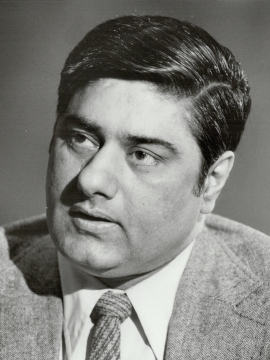
Hardial Bains was an Indo-Canadian microbiology lecturer, but was primarily known as the founder of a series of left-wing movements and parties foremost of which was the Communist Party of Canada (Marxist–Leninist). Presenting himself as staunchly anti-revisionist and pro-Stalinist, until his death, Bains acted as the spokesperson and ideological leader of the CPC(M-L) — known in elections as the Marxist–Leninist Party of Canada. During his lifetime, Bains' outlook swung from supporting the Soviet Union under Joseph Stalin, to Mao Zedong's China, then later to Enver Hoxha's Albania. Shortly before he died, and abandoning his previous sharp criticisms of the country, Bains turned to Fidel Castro's Cuba for inspiration. Spending most of his life in Canada, Bains was also politically active in England, Ireland, United States and India.
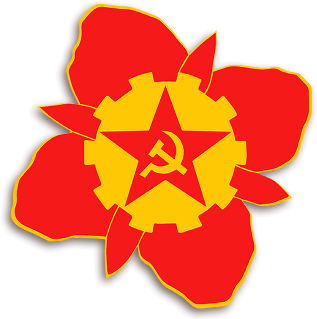
The Communist Party of Canada (Marxist–Leninist) is a federal political party in Canada. It was founded in 1970 by Hardial Bains, a staunch Stalinist and anti-revisionist. The CPC(M-L) has been registered with Elections Canada as the Marxist–Leninist Party of Canada (MLPC) since 1974, as the party is prohibited from using the name "Communist Party of Canada" in Canadian elections to avoid confusion among voters. The party is not an offshoot of the Communist Party of Canada; its early membership came from student-led organizations active in the 1960s. After a period of alignment with Maoism and China, the CPC(M-L) pursued a Hoxhaist, pro-Albanian line until the early 1990s. At present, the party directs most of its public support to Cuba and North Korea.
Denzil Dean Harber was an early British Trotskyist leader and later in his life a prominent British ornithologist.
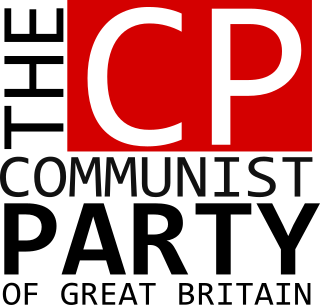
The Communist Party of Great Britain (CPGB) was the largest communist organisation in Britain and was founded in 1920 through a merger of several smaller Marxist groups. Many miners joined the CPGB in the 1926 general strike. In 1930, the CPGB founded the Daily Worker. In 1936, members of the party were present at the Battle of Cable Street, helping organise resistance against the British Union of Fascists. In the Spanish Civil War, the CPGB worked with the USSR to create the British Battalion of the International Brigades, which party activist Bill Alexander commanded.
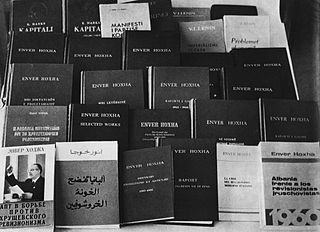
Hoxhaism is a variant of anti-revisionist Marxism–Leninism that developed in the late 1970s due to a split in the anti-revisionist movement, appearing after the ideological dispute between the Chinese Communist Party and the Party of Labour of Albania in 1978. The ideology is named after Enver Hoxha, First Secretary of the Party of Labour from 1941 to 1985 and leader of Albania from 1944 to 1985.

The Communist Party of Britain (Marxist–Leninist), often abbreviated as CPB-ML, is a British Marxist–Leninist political party. It originated in 1968 as an anti-revisionist split from the Communist Party of Great Britain and was chaired by Reg Birch until 1985. The official programme of the party since 1972 has been The British Working Class and its Party. The publication of the CPB-ML was originally known as The Worker, but is today called Workers.

The Communist Party of Great Britain (Marxist–Leninist), abbreviated CPGB-ML, is an anti-revisionist Marxist–Leninist communist party in the United Kingdom, active in England, Scotland, and Wales. The CPGB-ML was founded by Harpal Brar after a split from the Socialist Labour Party (SLP) on 3 July 2004. The CPGB-ML publishes the bimonthly newspaper Proletarian, and the Marxist–Leninist journal Lalkar is also closely allied with the party. The party chair is Ella Rule.
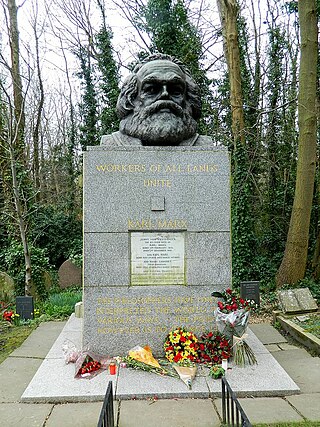
Far-left politics in the United Kingdom have existed since at least the 1840s, with the formation of various organisations following ideologies such as Marxism, revolutionary socialism, communism, anarchism and syndicalism.










